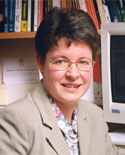Prof. Jocelyn Bell Burnell currently holds a Visiting Professorship at the University of Oxford and a Professorial Fellowship at Mansfield College, Oxford. Prof. Burnell was previously Dean of Science at the University of Bath and prior to that was for ten years Professor of Physics at the Open University, and also spent a year as a Distinguished Visiting Professor at Princeton University, USA.
Prof. Burnell started her academic career by failing the Northern Ireland equivalent of the 11+. After gaining a creditable number of O and A levels she went on to read a Physics degree at Glasgow University, Scotland. This was followed by a PhD in Cambridge (UK) in Radio Astronomy. During her time there she was involved in the discovery of pulsars, opening up a new branch of astrophysics – work which was recognised by the award of a Nobel Prize to her supervisor.
Marriage to a peripatetic husband meant she worked subsequently at the University of Southampton (in gamma ray astronomy) and at University College London (in X-ray astronomy) before returning to Scotland in the early 80’s to a job in infrared astronomy at the Royal Observatory, Edinburgh. Latterly she held a management job there, running the James Clerk Maxwell Telescope in Hawaii as a facility for astronomers in British, Canadian and Dutch universities. For most of this period she worked part-time while raising a family. She has chaired, served on, or serviced more Research Council Boards, Committees and Panels than she wishes to remember, and has also chaired a European Community Committee. She has been President of the Royal Astronomical Society.
Prof. Burnell has used telescopes flown on high-altitude balloons, launched on rockets and carried on satellites, and built a radio telescope which was firmly grounded in Cambridgeshire. Later in her career she could be found in Hawaii panting for breath at 14000′ and using the UK’s infrared or millimetre waveband telescopes.
The Oppenheimer prize, the Michelson medal, the Tinsley prize and the Magellanic Premium have been awarded to her by learned bodies in the US and the UK’s Royal Astronomical Society has presented her with the Herschel Medal. UK and US universities have conferred honorary doctorates on her, and she holds an Honorary Fellowship in New Hall, Cambridge. She was made a CBE in 1999 and that year also won the Edinburgh Medal for services to science and society. She became an FRS in 2003, and FRSE in 2004 and was elected a Foreign Associate of the US National Academy of Sciences in 2005.
The public appreciation and understanding of science have always been important to her, and she is much in demand as a speaker and broadcaster. In 1999 she toured Australia giving the Women in Physics Lecture. Her appointment to the Open University doubled the number of female professors of physics in the UK. She hopes that her presence as a senior woman in science will encourage more women to consider a career in science.
In her spare time she walks, gardens, listens to choral music and is active in the Religious Society of Friends (Quakers).




